2023年安徽省中考英语总复习一轮复习:第8讲-情态动词-教案(含答案)
文档属性
| 名称 | 2023年安徽省中考英语总复习一轮复习:第8讲-情态动词-教案(含答案) | 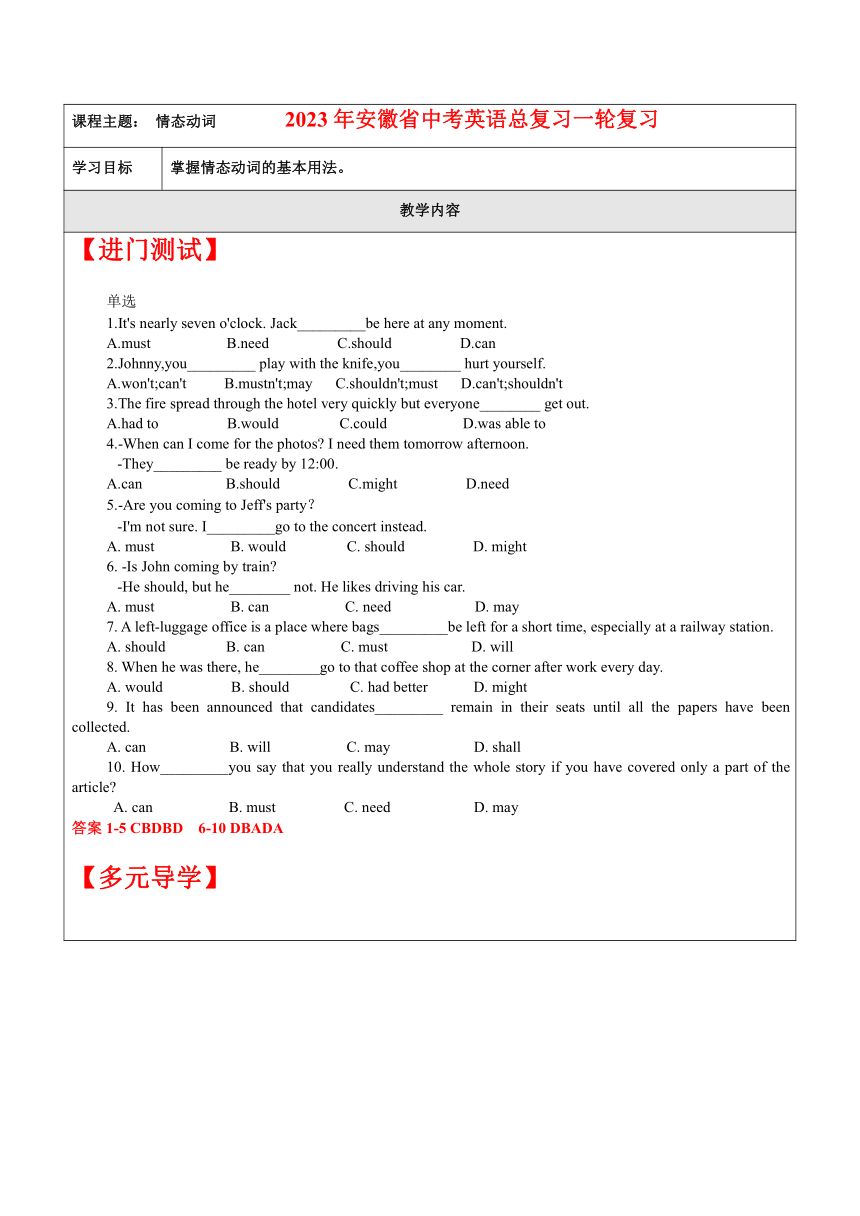 | |
| 格式 | zip | ||
| 文件大小 | 135.5KB | ||
| 资源类型 | 教案 | ||
| 版本资源 | 牛津译林版 | ||
| 科目 | 英语 | ||
| 更新时间 | 2023-04-14 07:34:03 | ||
图片预览

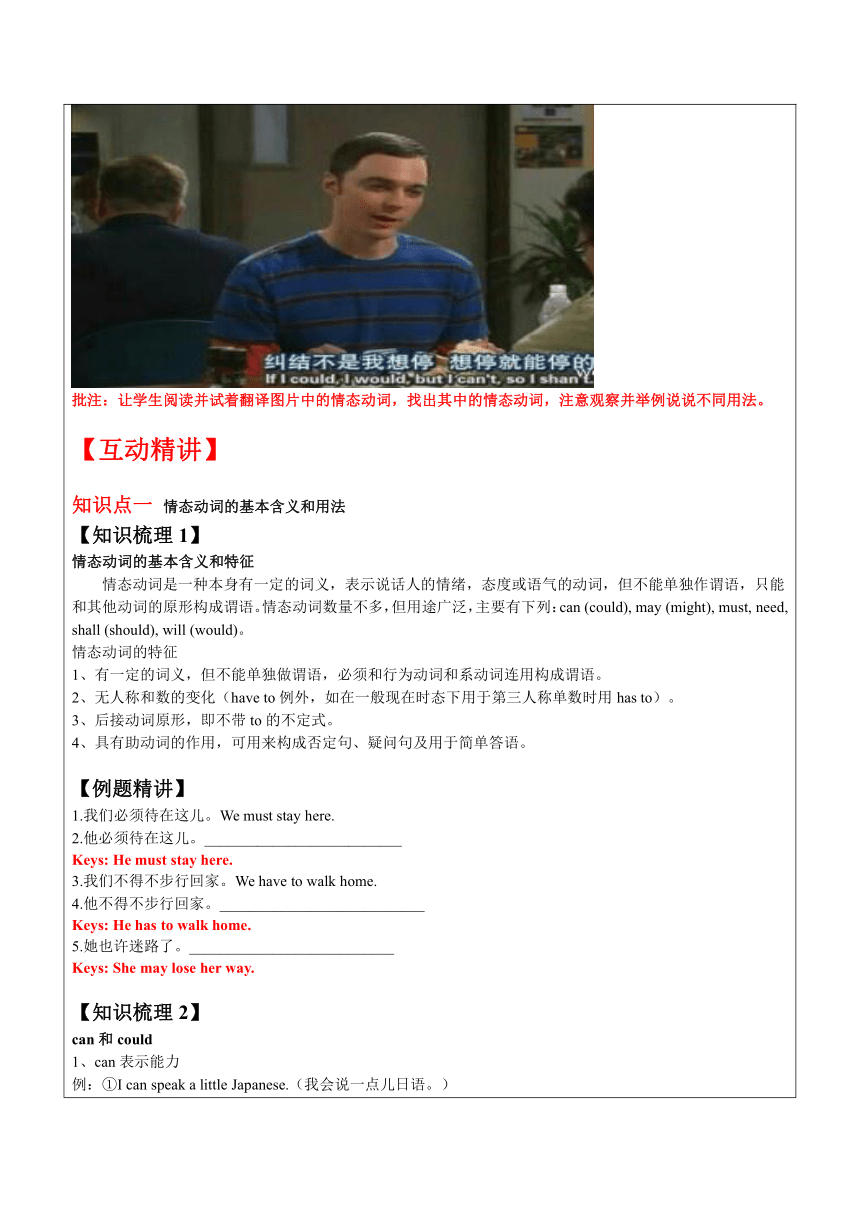
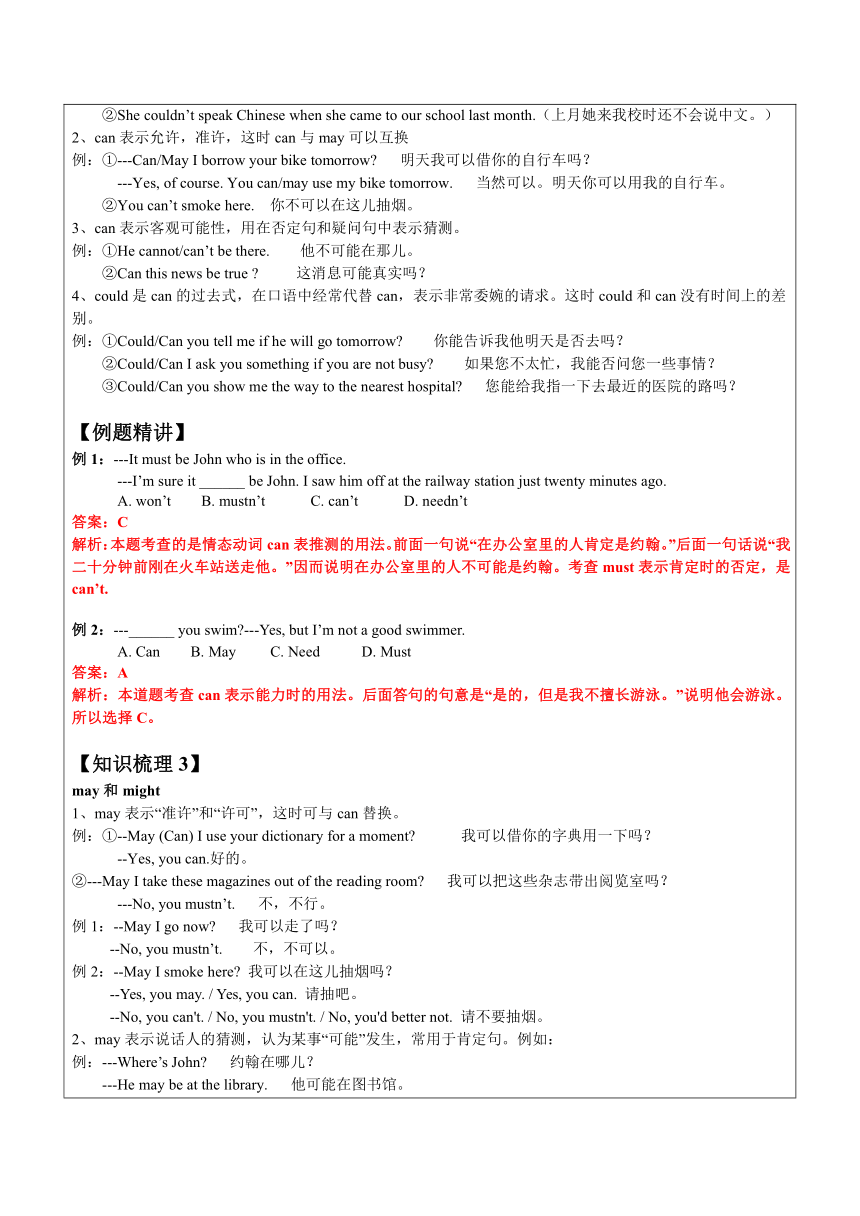
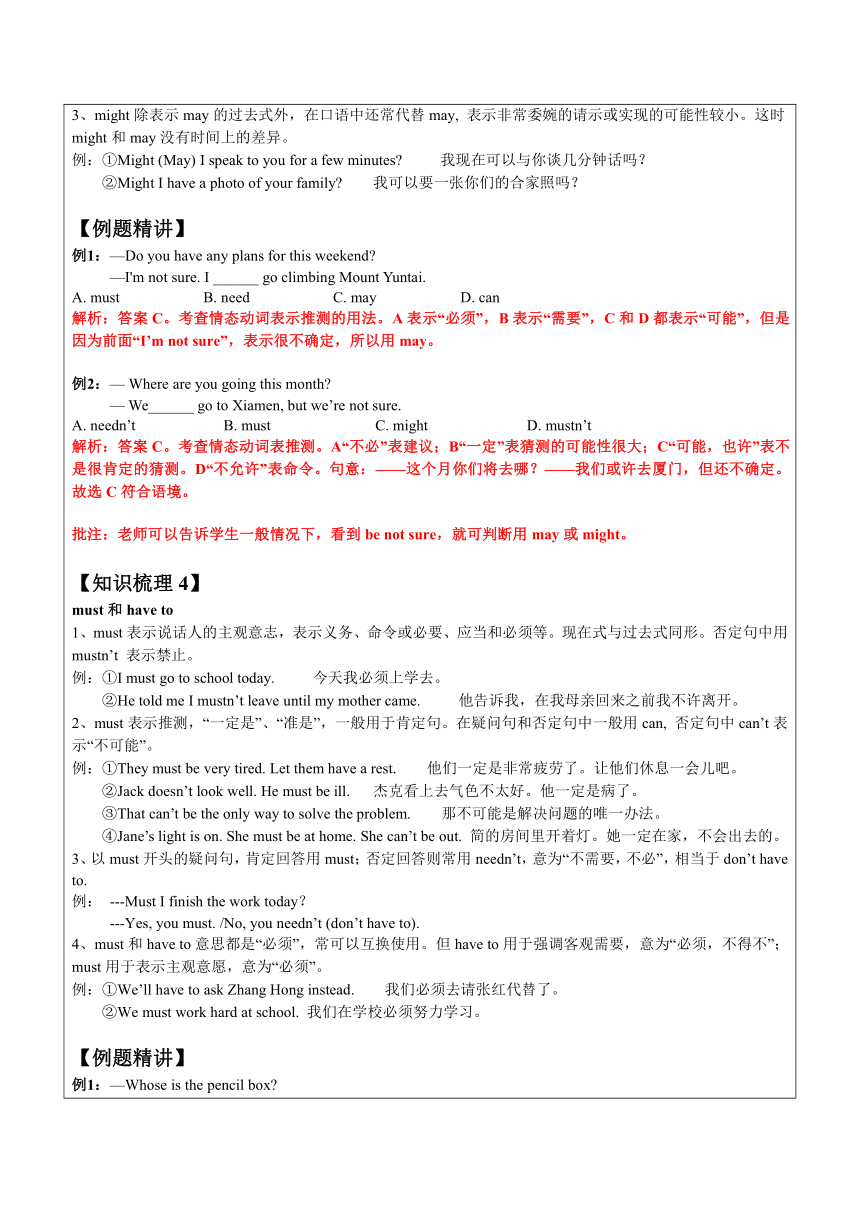
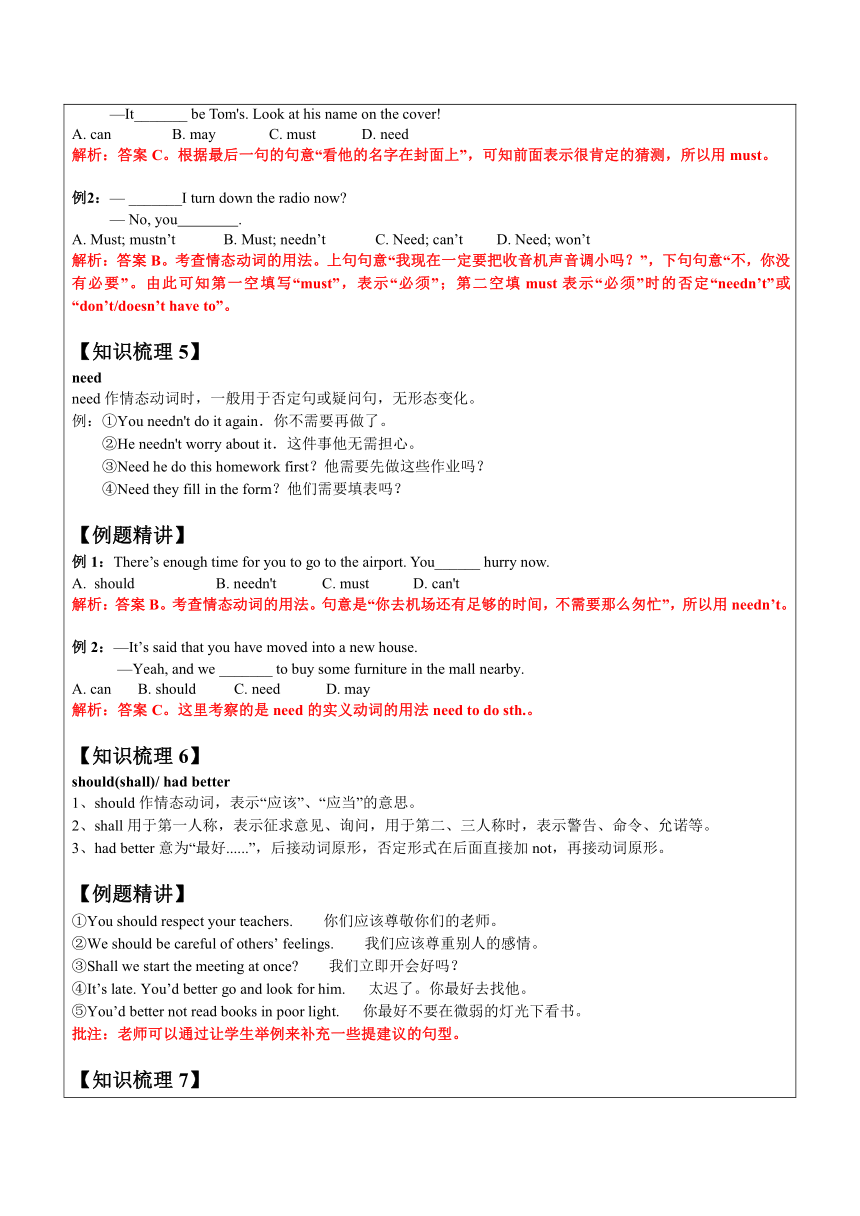
文档简介
课程主题: 情态动词 2023年安徽省中考英语总复习一轮复习
学习目标 掌握情态动词的基本用法。
教学内容
【进门测试】单选1.It's nearly seven o'clock. Jack_________be here at any moment.A.must B.need C.should D.can2.Johnny,you_________ play with the knife,you________ hurt yourself.A.won't;can't B.mustn't;may C.shouldn't;must D.can't;shouldn't3.The fire spread through the hotel very quickly but everyone________ get out.A.had to B.would C.could D.was able to4.-When can I come for the photos I need them tomorrow afternoon.-They_________ be ready by 12:00.A.can B.should C.might D.need5.-Are you coming to Jeff's party?-I'm not sure. I_________go to the concert instead.A. must B. would C. should D. might6. -Is John coming by train -He should, but he________ not. He likes driving his car.A. must B. can C. need D. may7. A left-luggage office is a place where bags_________be left for a short time, especially at a railway station.A. should B. can C. must D. will8. When he was there, he________go to that coffee shop at the corner after work every day.A. would B. should C. had better D. might9. It has been announced that candidates_________ remain in their seats until all the papers have been collected.A. can B. will C. may D. shall10. How_________you say that you really understand the whole story if you have covered only a part of the article A. can B. must C. need D. may答案1-5 CBDBD 6-10 DBADA 【多元导学】批注:让学生阅读并试着翻译图片中的情态动词,找出其中的情态动词,注意观察并举例说说不同用法。【互动精讲】知识点一 情态动词的基本含义和用法【知识梳理1】情态动词的基本含义和特征情态动词是一种本身有一定的词义,表示说话人的情绪,态度或语气的动词,但不能单独作谓语,只能和其他动词的原形 ( http: / / baike. / view / 2992327.htm )构成谓语。情态动词数量不多,但用途广泛,主要有下列:can (could), may (might), must, need, shall (should), will (would)。情态动词的特征有一定的词义,但不能单独做谓语,必须和行为动词和系动词连用构成谓语。无人称和数的变化(have to例外,如在一般现在时态下用于第三人称单数时用has to)。后接动词原形,即不带to的不定式。具有助动词的作用,可用来构成否定句、疑问句及用于简单答语。【例题精讲】1.我们必须待在这儿。We must stay here.2.他必须待在这儿。__________________________Keys: He must stay here.3.我们不得不步行回家。We have to walk home.4.他不得不步行回家。___________________________Keys: He has to walk home.5.她也许迷路了。___________________________Keys: She may lose her way.【知识梳理2】can和couldcan表示能力
例:①I can speak a little Japanese.(我会说一点儿日语。)
②She couldn’t speak Chinese when she came to our school last month.(上月她来我校时还不会说中文。)
2、can表示允许,准许,这时can与may可以互换
例:①---Can/May I borrow your bike tomorrow 明天我可以借你的自行车吗?
---Yes, of course. You can/may use my bike tomorrow. 当然可以。明天你可以用我的自行车。②You can’t smoke here. 你不可以在这儿抽烟。
3、can表示客观可能性,用在否定句和疑问句中表示猜测。
例:①He cannot/can’t be there. 他不可能在那儿。②Can this news be true 这消息可能真实吗?4、could是can的过去式,在口语中经常代替can,表示非常委婉的请求。这时could和can没有时间上的差别。例:①Could/Can you tell me if he will go tomorrow 你能告诉我他明天是否去吗?
②Could/Can I ask you something if you are not busy 如果您不太忙,我能否问您一些事情?
③Could/Can you show me the way to the nearest hospital 您能给我指一下去最近的医院的路吗?【例题精讲】例1:---It must be John who is in the office. ---I’m sure it ______ be John. I saw him off at the railway station just twenty minutes ago.A. won’t B. mustn’t C. can’t D. needn’t答案:C解析:本题考查的是情态动词can表推测的用法。前面一句说“在办公室里的人肯定是约翰。”后面一句话说“我二十分钟前刚在火车站送走他。”因而说明在办公室里的人不可能是约翰。考查must表示肯定时的否定,是can’t.例2:---______ you swim ---Yes, but I’m not a good swimmer.A. Can B. May C. Need D. Must答案:A 解析:本道题考查can表示能力时的用法。后面答句的句意是“是的,但是我不擅长游泳。”说明他会游泳。所以选择C。【知识梳理3】may和mightmay表示“准许”和“许可”,这时可与can替换。例:①--May (Can) I use your dictionary for a moment 我可以借你的字典用一下吗? --Yes, you can.好的。②---May I take these magazines out of the reading room 我可以把这些杂志带出阅览室吗? ---No, you mustn’t. 不,不行。例1:--May I go now 我可以走了吗? --No, you mustn’t. 不,不可以。例2:--May I smoke here 我可以在这儿抽烟吗?
--Yes, you may. / Yes, you can. 请抽吧。
--No, you can't. / No, you mustn't. / No, you'd better not. 请不要抽烟。
2、may表示说话人的猜测,认为某事“可能”发生,常用于肯定句。例如:
例:---Where’s John 约翰在哪儿? ---He may be at the library. 他可能在图书馆。3、might除表示may的过去式外,在口语中还常代替may, 表示非常委婉的请示或实现的可能性较小。这时might和may没有时间上的差异。例:①Might (May) I speak to you for a few minutes 我现在可以与你谈几分钟话吗?
②Might I have a photo of your family 我可以要一张你们的合家照吗?
【例题精讲】例1:—Do you have any plans for this weekend —I'm not sure. I ______ go climbing Mount Yuntai.A. must B. need C. may D. can解析:答案C。考查情态动词表示推测的用法。A表示“必须”,B表示“需要”,C和D都表示“可能”,但是因为前面“I’m not sure”,表示很不确定,所以用may。例2:— Where are you going this month — We______ go to Xiamen, but we’re not sure.A. needn’t B. must C. might D. mustn’t解析:答案C。考查情态动词表推测。A“不必”表建议;B“一定”表猜测的可能性很大;C“可能,也许”表不是很肯定的猜测。D“不允许”表命令。句意:——这个月你们将去哪?——我们或许去厦门,但还不确定。故选C符合语境。批注:老师可以告诉学生一般情况下,看到be not sure,就可判断用may或might。 【知识梳理4】must和have to
1、must表示说话人的主观意志,表示义务、命令或必要、应当和必须等。现在式与过去式同形。否定句中用mustn’t 表示禁止。例:①I must go to school today. 今天我必须上学去。
②He told me I mustn’t leave until my mother came. 他告诉我,在我母亲回来之前我不许离开。
2、must表示推测,“一定是”、“准是”,一般用于肯定句。在疑问句和否定句中一般用can, 否定句中can’t表示“不可能”。例:①They must be very tired. Let them have a rest. 他们一定是非常疲劳了。让他们休息一会儿吧。
②Jack doesn’t look well. He must be ill. 杰克看上去气色不太好。他一定是病了。 ③That can’t be the only way to solve the problem. 那不可能是解决问题的唯一办法。④Jane’s light is on. She must be at home. She can’t be out. 简的房间里开着灯。她一定在家,不会出去的。3、以must开头的疑问句,肯定回答用must;否定回答则常用needn’t,意为“不需要,不必”,相当于don’t have to.例: ---Must I finish the work today? ---Yes, you must. /No, you needn’t (don’t have to).must和have to意思都是“必须”,常可以互换使用。但have to用于强调客观需要,意为“必须,不得不”;must用于表示主观意愿,意为“必须”。例:①We’ll have to ask Zhang Hong instead. 我们必须去请张红代替了。②We must work hard at school. 我们在学校必须努力学习。【例题精讲】例1:—Whose is the pencil box —It_______ be Tom's. Look at his name on the cover!A. can B. may C. must D. need解析:答案C。根据最后一句的句意“看他的名字在封面上”,可知前面表示很肯定的猜测,所以用must。例2:— _______I turn down the radio now — No, you .A. Must; mustn’t B. Must; needn’t C. Need; can’t D. Need; won’t 解析:答案B。考查情态动词的用法。上句句意“我现在一定要把收音机声音调小吗?”,下句句意“不,你没有必要”。由此可知第一空填写“must”,表示“必须”;第二空填must表示“必须”时的否定“needn’t”或“don’t/doesn’t have to”。【知识梳理5】need
need作情态动词时,一般用于否定句或疑问句,无形态变化。例:①You needn't do it again.你不需要再做了。 ②He needn't worry about it.这件事他无需担心。 ③Need he do this homework first?他需要先做这些作业吗? ④Need they fill in the form?他们需要填表吗? 【例题精讲】例1:There’s enough time for you to go to the airport. You______ hurry now.should B. needn't C. must D. can't解析:答案B。考查情态动词的用法。句意是“你去机场还有足够的时间,不需要那么匆忙”,所以用needn’t。例2:—It’s said that you have moved into a new house. —Yeah, and we _______ to buy some furniture in the mall nearby. A. can B. should C. need D. may解析:答案C。这里考察的是need的实义动词的用法need to do sth.。【知识梳理6】should(shall)/ had better
1、should作情态动词,表示“应该”、“应当”的意思。2、shall用于第一人称,表示征求意见、询问,用于第二、三人称时,表示警告、命令、允诺等。3、had better意为“最好......”,后接动词原形,否定形式在后面直接加not,再接动词原形。【例题精讲】①You should respect your teachers. 你们应该尊敬你们的老师。
②We should be careful of others’ feelings. 我们应该尊重别人的感情。
③Shall we start the meeting at once 我们立即开会好吗?④It’s late. You’d better go and look for him. 太迟了。你最好去找他。
⑤You’d better not read books in poor light. 你最好不要在微弱的灯光下看书。批注:老师可以通过让学生举例来补充一些提建议的句型。 【知识梳理7】will和would1、will用于第二人称表示询问、请求,也可以表达现在的“意愿”。2、would用来表示过去的意愿或委婉的询问。【例题精讲】例:①Will you get me some chalk 你拿些粉笔给我好吗?
②Would you like some bananas 来点香蕉好吗?知识点二 情态动词之间的区分【知识梳理1】表示能够can和be able to的区别表示能力时用法相同,can只用于一般现在时和一般过去时(could),其他时态要用be able to。另外,表示过去某一特定情况下成功做到某事时,用be able to。【例题精讲】例:①Jim couldn’t speak English Chinese last year, but now he can.②We will be able to come back next week.③Finish your homework first, then you’ll _______ watch TV for an hour.A. can B. be able to C. able D could解析:答案B。will是助动词,其后应该用动词的原形,而can是情态动词,故不能与will连用,所以选B。【知识梳理2】表示推测can、may和must的区别在肯定句中,常用may表示可能在否定句中,若语气肯定,表示“不可能”时用can’t,若语气不肯定,表示“可能不”,则用may not。must表示非常肯定的推测,语气较强;其否定为can’t。【例题精讲】例1:---There is somebody knocking at the door. Who________ it be ---I’m not sure. It ________ be a postman.A. may; must B. will; can C. can; may D. may; will解析:答案C。这个可以根据下句判断,下句中的“I’m not sure”是个较明显的提示,需用may表示猜测语气非常不确定。例2: —Who’s the man over there Is it Mr. Black —It ______ be him. He’s much taller.A. may not B. can’t C. will not D. mustn’t 解析:答案B。考查情态动用法。 句意:那边那个人是谁?是布莱克先生吗?一定不是他,他高多了。情态动词表推测:“一定” 用must,“可能”用might、may、could;“一定不”用can’t。故选B。例3:It’s the library! So you________know shouting is not allowed here.A.can B.must C.need D.may解析:答案B。根据句意“这里是图书馆,所以你肯定知道这里不允许大声吵”,表示语气很肯定的猜测,用must。例4:—Isn’t that Mary’s new English teacher over there? —No, it _______ be her. I’m sure she doesn’t have long hair. A. won’t B. can’t C. mustn’t D. needn’t解析:答案B。这里表示对上句的推测“那不可能是她,因为我确定她没有长发”,表示“不可能”用can’t。例5:How nice the food smells! I’m sure it taste delicious. A. must B. can C. may D. should解析:答案A。“I’m sure”后接很肯定的猜测,用must。例6:―Mr. Smith must have been to your home this morning. ―No, he , because he didn’t know my address. A. couldn’t B. can’t C. mustn’t D. may not 解析:答案A。根据下句后半句“他不知道我的地址”可知前面是说“他不可能去我家”,用can’t,但本题中要注意must have done结构是对过去事实的推测。因此只有A选项是过去时。【知识梳理3】表示委婉语气could, would和might这几个词有时并不表示过去式,而是表示委婉客气的语气。【例题精讲】例1: —— ________ you mind speaking more slowly I can hardly hear you. —— Of course not.A. Would B. Will C. May D. Might解析:答案A。这里并不是过去式,而是更委婉地表达想法。例2:Your T-shirt is so cool. _________ you tell me where you bought it A. Would B. Could C. Should D. Must 解析:答案B。句意为“你能否告诉我你在哪买的”,这里表示询问,语气要很客气,所以用“could”。【知识梳理4】表示许可can和may以及回答表示许可的时候,两者常可以互换。【例题精讲】例1: —________ I swim here [来源:中国教育^%#出版&网@] — I’m sorry. Children__________swim alone here.[来源:@~中&^教*网]A. Must; can't B. May; must C. Can; mustn't D. Can't; can解析:答案C。上句是询问“可不可以在这里游泳”,用can或may都可以,但下句句意是“孩子禁止单独在这里游泳”,用mustn’t。例2:翻译句子①--妈妈,我可以出去踢足球吗?(may) --可以。②--我可以和你一起去看电影吗?(may) --不,不可以。解析:答案①--Mum, may I go out to play football --Yes, you may/can. ②--May I go to the cinema with you --No, you can’t/had better not.【知识梳理5】maybe和may be的区别前者为副词,表示“大概、也许”,相当于perhaps,常用于句首。后者是情态动词may,后加上动词原形be,常用在句中。【例题精讲】例1: — Is Jim coming by train —I’m not sure. He________ in his car.maybe B. may be C. may D. can解析:答案B。句意“他可能是开车的”,这里需要一个谓语动词,只有B。 例2:用maybe和may be填空①—Can Tina play the violin?蒂娜会拉小提琴吗?
—_________.可能会吧。 ②You _____________ right. 你也许是对的。解析:答案①Maybe ②may be。①句表示“大概、可能、也许”,②因为句中缺少一个谓语动词,may be表示“可能是,也许是”,符合题意。【课堂练习】1. In Britain, cars _______ keep to the left according to the traffic rules.(2017高淳二模)A. must B. may C. can D. need2. —Many people prefer spending much time on smart phones to reading today.—That’s too bad. Everyone be a book lover. Reading brings much pleasure.(2017联合体二模)A. would B. may C. must D should3. — It’s very kind of Lily to prepare all the things for the party. — Do you mean we ______ bring anything (2017秦淮二模) A. can’t B. shouldn’t C. needn’t D. mustn’t4. —Dad, may I go out to play basketball with James —If you _______, come back before lunch.(2017江宁二模)A. must B. may C. might D. should 5. — Robert, I’m afraid I _______ finish the work today.— It doesn’t matter, you may finish it tomorrow.(2017建邺二模) A. needn’t B. can’t C. mustn’t D. shouldn’t6. ---Kate, it’s midnight! Why stay up so late ---I’d like to go to bed earlier, but the test paper ______ be handed in tomorrow morning.(2017鼓楼区一模) A. may B. should C. can D. must7. ---- How nice the building is! What is it for ---- It __________ a hotel. But I am not sure.(2017溧水区一模) A. must be B. have to be C. may be D. can 8. ---Who will give us the speech on public manners ---Mr. Brown _________, but I’m not sure.(2017江宁区一模) A. can B. need C. must D. might9. ---I hear that you’ve got plenty of foreign coins. I have a look ---Sure. Let me show you.(2017建邺区一模)A. Should B. Need C. Must D. May 10. ---Who is singing in the next room Is it Lucy ---No, it be her. She has gone to Hainan on holiday.(2017联合体一模)can’t B. mustn’t C. may not D. needn’t答案1-5 ADCAB 6-10DCDDA 【课堂检测】检测题(一):单项选择( )1. — I get there on time today — No, you needn’t. A. Can B. May C. Must D. Should( )2. A teacher do every exercise, but a pupil must . A. mayn’t B. needn’t C. can’t D. mustn’t( )3. —Must we finish copying all these articles this morning — No, you .A. mustn’t B. haven’t C. not have to D. don’t have to( )4. I have a word with the teacher, sir A. Will B. Would C. May D. Should ( )5. He finish his homework on time. A. need not to B. doesn’t need C. needs to D. needs( )6. Neither he nor his children able to play table tennis. A. can be B. could C. is D. are( )7. We laugh at others. A. shouldn’t B. may not C. needn’t D. can’t( )8. — May I go now — No, you . You stay here. A. needn’t; have to B. needn’t; must C. mustn’t; have to D. mustn’t; has to( )9. “What I do for you ” means “ I help you ”A. can; Must B. shall; Need C. can; Can D. will; shall( )10. I like to go to the cinema with mother on Saturday evening. A. will B. shall C. would D. can答案:1-5 CBDCC 6-10 DACCC检测题(二):用can, may, must, need, have to, had better的适当形式填空:1. You ________________ return the library book on time.2. I ______________ (not) find the way to the hospital. _______________ you show me the way 3. —________________ I finish the work right now — No, you ________________ (not). You ____________ do it later.4. He said he ________________ (not) come tonight.5. Her mother was ill. She ________________ stay at home and look after her.6. It’s time for class. You ________________ stop playing football or you __________be late for class.7. We ________________ start right now, or they would get there first.8. The cloud is lifting, so it ________________ (not) be a rainy day tomorrow.答案:1. must 2. can’t, Could 3. Must, needn’t, may 4. couldn’t/might not 5. had to 6. must, may/must 7. had better 8. can’t检测题(三):选择合适的词或词组填空1. I have a headache. I __________ take an aspirin.(had better; would better)2. He looks sleepy. He ________ have gone bed very late last night. (must; should)3. I want to go to the office, but you __________ with me.(need not to go; need not go)4. I _________ have taken those books to the library last week.(ought to; must)5. The mother is telling her son, “You __________ eat with your fingers!”(wouldn’t; mustn’t)6. He was a good swimmer so he _______ swim to the river bank when the boat sank. (was able to; could)7. To travel from England to Scotland you __________ a passport.(don’t need; needn’t)8. He went on foot, but he __________ by bus.(ought have gone; should have gone)9. A: Did Ken take the job in the bookstore B: No, but I think he __________.(must have; should have)10. He __________ talk for hours, if you let him.(can; will)11. You __________ use this toothbrush, it’s mine.(may not; shall not)12. No matter what people say, I __________ do as I like.(shall; will)13. “I’m willing to let you take whatever you like.” Means “you ______ take whatever you like.” (shall; will)14. A: I haven’t felt well for a week. B: You __________ see a doctor.(had better; should have to)15. A: He is late. __________ he have missed the bus B: Yes, he must have missed the bus.(Can; Must)1. 答案had better。表示建议“你最好吃一片阿司匹林”。 2. 答案must。这里根据前句“你看起来很困”,很肯定的猜测“昨晚睡的很晚”,所以用must。 3. 答案need not go。need作为情态动词时,否定直接在后面接not,若是实义动词,否定需在前面加don’t/doesn’t/didn’t。 4. 答案ought to。这里表示一种义务和责任,“应该上周把这些书带到图书馆”,所以用ought to。 5. 答案mustn’t。这里表示妈妈很严厉的话语“你禁止用手吃饭”。 6. 答案was able to。这里从意思上两个选项都可以,但这里更表示在沉船的情况下成功游到河岸上,所以用be able to。 7. 答案don’t need。这里需要一个实义动词表示“不需要”,所以用实义动词need的否定形式。 8. 答案should have gone。这两个选项很好判断,因为ought后面需接to,再接动词原形,而should后直接接动词原形。 9. 答案should have。这里只是表示一种建议“应该接受这份工作”,而不能强制性的要求“必须接受”。 10. 答案will。这里表示意愿,“如果你让他讲,他会讲数小时”。 11. 答案shall not。这里根据后句句意“那把牙刷是我的”,所以“你不应该用”。 12. 答案will。句意“不管别人说什么,我都会按自己喜欢的去做”,这是表达现在的一种意愿,用will。 13. 答案shall。前句是一个承诺,后句要表达同样的意思,在用于第二、三人称时,shall可表示允诺。 14. 答案had better。这里是一种关心的建议,语气较柔和。“你最好去看下医生”。 15. 答案Can。这里是可能的猜测,语气并不强烈。【要点回顾】主要情态动词的基本含义和用法(无人称和数的变化have to例外,如在一般现在时态下用于第三人称单数时用has to。后接动词原形,即不带to的不定式。)2.情态动词之间的区分(如can 和 be able to 的用法; 表示推测的can may should must的区分)【温故知新】一、用适当的情态动词填空1. You _______________(not) return the book to me now. You can keep it till next week if you like it.2. A computer ___________ (not) think for itself. It must be told what to do.3. You ______________(not) throw the paper about. You should keep the room clean and tidy.4. I _____________ go climbing with them, but I’m not sure yet.5. Lots of people went to see the film, so I think it__________ be very interesting.6. ---Must I finish reading the book in a week ---No, you ___________.7. _________ we go swimming in the river this afternoon 8. Mr. Smith _________(not) be in his bedroom, he _________ be in his office. Because he phoned me just now.9. I’ll _________ look after the boy because he is too young.10. He is so strong that he _________ lift the box easily.答案:1. needn’t 2. can’t 3. mustn’t 4. may 5. must 6. needn’t/don’t have to 7. Shall 8. can’t; must 9. have to 10. can二、单选( )1.—Mum.must I go shopping with you —No,you .You can watch the film Big Hero 6 with your friends. A.needn't B.can't C.shouldn't D.mustn't( )2.— I know by what time you want the project to be done —By the day after tomorrow. you finish it on time A. May; Can B. Must; Need C. Could; Must D. Need; Would( )3.—Must I finish all the homework this evening —No,you .Tomorrow is Saturday,and you have enough time for it. A.mustn't B.needn't C.won't D.can't答案:AAB预习思考动词的种类有哪些?常考的动词及动词短语有哪些?
学习目标 掌握情态动词的基本用法。
教学内容
【进门测试】单选1.It's nearly seven o'clock. Jack_________be here at any moment.A.must B.need C.should D.can2.Johnny,you_________ play with the knife,you________ hurt yourself.A.won't;can't B.mustn't;may C.shouldn't;must D.can't;shouldn't3.The fire spread through the hotel very quickly but everyone________ get out.A.had to B.would C.could D.was able to4.-When can I come for the photos I need them tomorrow afternoon.-They_________ be ready by 12:00.A.can B.should C.might D.need5.-Are you coming to Jeff's party?-I'm not sure. I_________go to the concert instead.A. must B. would C. should D. might6. -Is John coming by train -He should, but he________ not. He likes driving his car.A. must B. can C. need D. may7. A left-luggage office is a place where bags_________be left for a short time, especially at a railway station.A. should B. can C. must D. will8. When he was there, he________go to that coffee shop at the corner after work every day.A. would B. should C. had better D. might9. It has been announced that candidates_________ remain in their seats until all the papers have been collected.A. can B. will C. may D. shall10. How_________you say that you really understand the whole story if you have covered only a part of the article A. can B. must C. need D. may答案1-5 CBDBD 6-10 DBADA 【多元导学】批注:让学生阅读并试着翻译图片中的情态动词,找出其中的情态动词,注意观察并举例说说不同用法。【互动精讲】知识点一 情态动词的基本含义和用法【知识梳理1】情态动词的基本含义和特征情态动词是一种本身有一定的词义,表示说话人的情绪,态度或语气的动词,但不能单独作谓语,只能和其他动词的原形 ( http: / / baike. / view / 2992327.htm )构成谓语。情态动词数量不多,但用途广泛,主要有下列:can (could), may (might), must, need, shall (should), will (would)。情态动词的特征有一定的词义,但不能单独做谓语,必须和行为动词和系动词连用构成谓语。无人称和数的变化(have to例外,如在一般现在时态下用于第三人称单数时用has to)。后接动词原形,即不带to的不定式。具有助动词的作用,可用来构成否定句、疑问句及用于简单答语。【例题精讲】1.我们必须待在这儿。We must stay here.2.他必须待在这儿。__________________________Keys: He must stay here.3.我们不得不步行回家。We have to walk home.4.他不得不步行回家。___________________________Keys: He has to walk home.5.她也许迷路了。___________________________Keys: She may lose her way.【知识梳理2】can和couldcan表示能力
例:①I can speak a little Japanese.(我会说一点儿日语。)
②She couldn’t speak Chinese when she came to our school last month.(上月她来我校时还不会说中文。)
2、can表示允许,准许,这时can与may可以互换
例:①---Can/May I borrow your bike tomorrow 明天我可以借你的自行车吗?
---Yes, of course. You can/may use my bike tomorrow. 当然可以。明天你可以用我的自行车。②You can’t smoke here. 你不可以在这儿抽烟。
3、can表示客观可能性,用在否定句和疑问句中表示猜测。
例:①He cannot/can’t be there. 他不可能在那儿。②Can this news be true 这消息可能真实吗?4、could是can的过去式,在口语中经常代替can,表示非常委婉的请求。这时could和can没有时间上的差别。例:①Could/Can you tell me if he will go tomorrow 你能告诉我他明天是否去吗?
②Could/Can I ask you something if you are not busy 如果您不太忙,我能否问您一些事情?
③Could/Can you show me the way to the nearest hospital 您能给我指一下去最近的医院的路吗?【例题精讲】例1:---It must be John who is in the office. ---I’m sure it ______ be John. I saw him off at the railway station just twenty minutes ago.A. won’t B. mustn’t C. can’t D. needn’t答案:C解析:本题考查的是情态动词can表推测的用法。前面一句说“在办公室里的人肯定是约翰。”后面一句话说“我二十分钟前刚在火车站送走他。”因而说明在办公室里的人不可能是约翰。考查must表示肯定时的否定,是can’t.例2:---______ you swim ---Yes, but I’m not a good swimmer.A. Can B. May C. Need D. Must答案:A 解析:本道题考查can表示能力时的用法。后面答句的句意是“是的,但是我不擅长游泳。”说明他会游泳。所以选择C。【知识梳理3】may和mightmay表示“准许”和“许可”,这时可与can替换。例:①--May (Can) I use your dictionary for a moment 我可以借你的字典用一下吗? --Yes, you can.好的。②---May I take these magazines out of the reading room 我可以把这些杂志带出阅览室吗? ---No, you mustn’t. 不,不行。例1:--May I go now 我可以走了吗? --No, you mustn’t. 不,不可以。例2:--May I smoke here 我可以在这儿抽烟吗?
--Yes, you may. / Yes, you can. 请抽吧。
--No, you can't. / No, you mustn't. / No, you'd better not. 请不要抽烟。
2、may表示说话人的猜测,认为某事“可能”发生,常用于肯定句。例如:
例:---Where’s John 约翰在哪儿? ---He may be at the library. 他可能在图书馆。3、might除表示may的过去式外,在口语中还常代替may, 表示非常委婉的请示或实现的可能性较小。这时might和may没有时间上的差异。例:①Might (May) I speak to you for a few minutes 我现在可以与你谈几分钟话吗?
②Might I have a photo of your family 我可以要一张你们的合家照吗?
【例题精讲】例1:—Do you have any plans for this weekend —I'm not sure. I ______ go climbing Mount Yuntai.A. must B. need C. may D. can解析:答案C。考查情态动词表示推测的用法。A表示“必须”,B表示“需要”,C和D都表示“可能”,但是因为前面“I’m not sure”,表示很不确定,所以用may。例2:— Where are you going this month — We______ go to Xiamen, but we’re not sure.A. needn’t B. must C. might D. mustn’t解析:答案C。考查情态动词表推测。A“不必”表建议;B“一定”表猜测的可能性很大;C“可能,也许”表不是很肯定的猜测。D“不允许”表命令。句意:——这个月你们将去哪?——我们或许去厦门,但还不确定。故选C符合语境。批注:老师可以告诉学生一般情况下,看到be not sure,就可判断用may或might。 【知识梳理4】must和have to
1、must表示说话人的主观意志,表示义务、命令或必要、应当和必须等。现在式与过去式同形。否定句中用mustn’t 表示禁止。例:①I must go to school today. 今天我必须上学去。
②He told me I mustn’t leave until my mother came. 他告诉我,在我母亲回来之前我不许离开。
2、must表示推测,“一定是”、“准是”,一般用于肯定句。在疑问句和否定句中一般用can, 否定句中can’t表示“不可能”。例:①They must be very tired. Let them have a rest. 他们一定是非常疲劳了。让他们休息一会儿吧。
②Jack doesn’t look well. He must be ill. 杰克看上去气色不太好。他一定是病了。 ③That can’t be the only way to solve the problem. 那不可能是解决问题的唯一办法。④Jane’s light is on. She must be at home. She can’t be out. 简的房间里开着灯。她一定在家,不会出去的。3、以must开头的疑问句,肯定回答用must;否定回答则常用needn’t,意为“不需要,不必”,相当于don’t have to.例: ---Must I finish the work today? ---Yes, you must. /No, you needn’t (don’t have to).must和have to意思都是“必须”,常可以互换使用。但have to用于强调客观需要,意为“必须,不得不”;must用于表示主观意愿,意为“必须”。例:①We’ll have to ask Zhang Hong instead. 我们必须去请张红代替了。②We must work hard at school. 我们在学校必须努力学习。【例题精讲】例1:—Whose is the pencil box —It_______ be Tom's. Look at his name on the cover!A. can B. may C. must D. need解析:答案C。根据最后一句的句意“看他的名字在封面上”,可知前面表示很肯定的猜测,所以用must。例2:— _______I turn down the radio now — No, you .A. Must; mustn’t B. Must; needn’t C. Need; can’t D. Need; won’t 解析:答案B。考查情态动词的用法。上句句意“我现在一定要把收音机声音调小吗?”,下句句意“不,你没有必要”。由此可知第一空填写“must”,表示“必须”;第二空填must表示“必须”时的否定“needn’t”或“don’t/doesn’t have to”。【知识梳理5】need
need作情态动词时,一般用于否定句或疑问句,无形态变化。例:①You needn't do it again.你不需要再做了。 ②He needn't worry about it.这件事他无需担心。 ③Need he do this homework first?他需要先做这些作业吗? ④Need they fill in the form?他们需要填表吗? 【例题精讲】例1:There’s enough time for you to go to the airport. You______ hurry now.should B. needn't C. must D. can't解析:答案B。考查情态动词的用法。句意是“你去机场还有足够的时间,不需要那么匆忙”,所以用needn’t。例2:—It’s said that you have moved into a new house. —Yeah, and we _______ to buy some furniture in the mall nearby. A. can B. should C. need D. may解析:答案C。这里考察的是need的实义动词的用法need to do sth.。【知识梳理6】should(shall)/ had better
1、should作情态动词,表示“应该”、“应当”的意思。2、shall用于第一人称,表示征求意见、询问,用于第二、三人称时,表示警告、命令、允诺等。3、had better意为“最好......”,后接动词原形,否定形式在后面直接加not,再接动词原形。【例题精讲】①You should respect your teachers. 你们应该尊敬你们的老师。
②We should be careful of others’ feelings. 我们应该尊重别人的感情。
③Shall we start the meeting at once 我们立即开会好吗?④It’s late. You’d better go and look for him. 太迟了。你最好去找他。
⑤You’d better not read books in poor light. 你最好不要在微弱的灯光下看书。批注:老师可以通过让学生举例来补充一些提建议的句型。 【知识梳理7】will和would1、will用于第二人称表示询问、请求,也可以表达现在的“意愿”。2、would用来表示过去的意愿或委婉的询问。【例题精讲】例:①Will you get me some chalk 你拿些粉笔给我好吗?
②Would you like some bananas 来点香蕉好吗?知识点二 情态动词之间的区分【知识梳理1】表示能够can和be able to的区别表示能力时用法相同,can只用于一般现在时和一般过去时(could),其他时态要用be able to。另外,表示过去某一特定情况下成功做到某事时,用be able to。【例题精讲】例:①Jim couldn’t speak English Chinese last year, but now he can.②We will be able to come back next week.③Finish your homework first, then you’ll _______ watch TV for an hour.A. can B. be able to C. able D could解析:答案B。will是助动词,其后应该用动词的原形,而can是情态动词,故不能与will连用,所以选B。【知识梳理2】表示推测can、may和must的区别在肯定句中,常用may表示可能在否定句中,若语气肯定,表示“不可能”时用can’t,若语气不肯定,表示“可能不”,则用may not。must表示非常肯定的推测,语气较强;其否定为can’t。【例题精讲】例1:---There is somebody knocking at the door. Who________ it be ---I’m not sure. It ________ be a postman.A. may; must B. will; can C. can; may D. may; will解析:答案C。这个可以根据下句判断,下句中的“I’m not sure”是个较明显的提示,需用may表示猜测语气非常不确定。例2: —Who’s the man over there Is it Mr. Black —It ______ be him. He’s much taller.A. may not B. can’t C. will not D. mustn’t 解析:答案B。考查情态动用法。 句意:那边那个人是谁?是布莱克先生吗?一定不是他,他高多了。情态动词表推测:“一定” 用must,“可能”用might、may、could;“一定不”用can’t。故选B。例3:It’s the library! So you________know shouting is not allowed here.A.can B.must C.need D.may解析:答案B。根据句意“这里是图书馆,所以你肯定知道这里不允许大声吵”,表示语气很肯定的猜测,用must。例4:—Isn’t that Mary’s new English teacher over there? —No, it _______ be her. I’m sure she doesn’t have long hair. A. won’t B. can’t C. mustn’t D. needn’t解析:答案B。这里表示对上句的推测“那不可能是她,因为我确定她没有长发”,表示“不可能”用can’t。例5:How nice the food smells! I’m sure it taste delicious. A. must B. can C. may D. should解析:答案A。“I’m sure”后接很肯定的猜测,用must。例6:―Mr. Smith must have been to your home this morning. ―No, he , because he didn’t know my address. A. couldn’t B. can’t C. mustn’t D. may not 解析:答案A。根据下句后半句“他不知道我的地址”可知前面是说“他不可能去我家”,用can’t,但本题中要注意must have done结构是对过去事实的推测。因此只有A选项是过去时。【知识梳理3】表示委婉语气could, would和might这几个词有时并不表示过去式,而是表示委婉客气的语气。【例题精讲】例1: —— ________ you mind speaking more slowly I can hardly hear you. —— Of course not.A. Would B. Will C. May D. Might解析:答案A。这里并不是过去式,而是更委婉地表达想法。例2:Your T-shirt is so cool. _________ you tell me where you bought it A. Would B. Could C. Should D. Must 解析:答案B。句意为“你能否告诉我你在哪买的”,这里表示询问,语气要很客气,所以用“could”。【知识梳理4】表示许可can和may以及回答表示许可的时候,两者常可以互换。【例题精讲】例1: —________ I swim here [来源:中国教育^%#出版&网@] — I’m sorry. Children__________swim alone here.[来源:@~中&^教*网]A. Must; can't B. May; must C. Can; mustn't D. Can't; can解析:答案C。上句是询问“可不可以在这里游泳”,用can或may都可以,但下句句意是“孩子禁止单独在这里游泳”,用mustn’t。例2:翻译句子①--妈妈,我可以出去踢足球吗?(may) --可以。②--我可以和你一起去看电影吗?(may) --不,不可以。解析:答案①--Mum, may I go out to play football --Yes, you may/can. ②--May I go to the cinema with you --No, you can’t/had better not.【知识梳理5】maybe和may be的区别前者为副词,表示“大概、也许”,相当于perhaps,常用于句首。后者是情态动词may,后加上动词原形be,常用在句中。【例题精讲】例1: — Is Jim coming by train —I’m not sure. He________ in his car.maybe B. may be C. may D. can解析:答案B。句意“他可能是开车的”,这里需要一个谓语动词,只有B。 例2:用maybe和may be填空①—Can Tina play the violin?蒂娜会拉小提琴吗?
—_________.可能会吧。 ②You _____________ right. 你也许是对的。解析:答案①Maybe ②may be。①句表示“大概、可能、也许”,②因为句中缺少一个谓语动词,may be表示“可能是,也许是”,符合题意。【课堂练习】1. In Britain, cars _______ keep to the left according to the traffic rules.(2017高淳二模)A. must B. may C. can D. need2. —Many people prefer spending much time on smart phones to reading today.—That’s too bad. Everyone be a book lover. Reading brings much pleasure.(2017联合体二模)A. would B. may C. must D should3. — It’s very kind of Lily to prepare all the things for the party. — Do you mean we ______ bring anything (2017秦淮二模) A. can’t B. shouldn’t C. needn’t D. mustn’t4. —Dad, may I go out to play basketball with James —If you _______, come back before lunch.(2017江宁二模)A. must B. may C. might D. should 5. — Robert, I’m afraid I _______ finish the work today.— It doesn’t matter, you may finish it tomorrow.(2017建邺二模) A. needn’t B. can’t C. mustn’t D. shouldn’t6. ---Kate, it’s midnight! Why stay up so late ---I’d like to go to bed earlier, but the test paper ______ be handed in tomorrow morning.(2017鼓楼区一模) A. may B. should C. can D. must7. ---- How nice the building is! What is it for ---- It __________ a hotel. But I am not sure.(2017溧水区一模) A. must be B. have to be C. may be D. can 8. ---Who will give us the speech on public manners ---Mr. Brown _________, but I’m not sure.(2017江宁区一模) A. can B. need C. must D. might9. ---I hear that you’ve got plenty of foreign coins. I have a look ---Sure. Let me show you.(2017建邺区一模)A. Should B. Need C. Must D. May 10. ---Who is singing in the next room Is it Lucy ---No, it be her. She has gone to Hainan on holiday.(2017联合体一模)can’t B. mustn’t C. may not D. needn’t答案1-5 ADCAB 6-10DCDDA 【课堂检测】检测题(一):单项选择( )1. — I get there on time today — No, you needn’t. A. Can B. May C. Must D. Should( )2. A teacher do every exercise, but a pupil must . A. mayn’t B. needn’t C. can’t D. mustn’t( )3. —Must we finish copying all these articles this morning — No, you .A. mustn’t B. haven’t C. not have to D. don’t have to( )4. I have a word with the teacher, sir A. Will B. Would C. May D. Should ( )5. He finish his homework on time. A. need not to B. doesn’t need C. needs to D. needs( )6. Neither he nor his children able to play table tennis. A. can be B. could C. is D. are( )7. We laugh at others. A. shouldn’t B. may not C. needn’t D. can’t( )8. — May I go now — No, you . You stay here. A. needn’t; have to B. needn’t; must C. mustn’t; have to D. mustn’t; has to( )9. “What I do for you ” means “ I help you ”A. can; Must B. shall; Need C. can; Can D. will; shall( )10. I like to go to the cinema with mother on Saturday evening. A. will B. shall C. would D. can答案:1-5 CBDCC 6-10 DACCC检测题(二):用can, may, must, need, have to, had better的适当形式填空:1. You ________________ return the library book on time.2. I ______________ (not) find the way to the hospital. _______________ you show me the way 3. —________________ I finish the work right now — No, you ________________ (not). You ____________ do it later.4. He said he ________________ (not) come tonight.5. Her mother was ill. She ________________ stay at home and look after her.6. It’s time for class. You ________________ stop playing football or you __________be late for class.7. We ________________ start right now, or they would get there first.8. The cloud is lifting, so it ________________ (not) be a rainy day tomorrow.答案:1. must 2. can’t, Could 3. Must, needn’t, may 4. couldn’t/might not 5. had to 6. must, may/must 7. had better 8. can’t检测题(三):选择合适的词或词组填空1. I have a headache. I __________ take an aspirin.(had better; would better)2. He looks sleepy. He ________ have gone bed very late last night. (must; should)3. I want to go to the office, but you __________ with me.(need not to go; need not go)4. I _________ have taken those books to the library last week.(ought to; must)5. The mother is telling her son, “You __________ eat with your fingers!”(wouldn’t; mustn’t)6. He was a good swimmer so he _______ swim to the river bank when the boat sank. (was able to; could)7. To travel from England to Scotland you __________ a passport.(don’t need; needn’t)8. He went on foot, but he __________ by bus.(ought have gone; should have gone)9. A: Did Ken take the job in the bookstore B: No, but I think he __________.(must have; should have)10. He __________ talk for hours, if you let him.(can; will)11. You __________ use this toothbrush, it’s mine.(may not; shall not)12. No matter what people say, I __________ do as I like.(shall; will)13. “I’m willing to let you take whatever you like.” Means “you ______ take whatever you like.” (shall; will)14. A: I haven’t felt well for a week. B: You __________ see a doctor.(had better; should have to)15. A: He is late. __________ he have missed the bus B: Yes, he must have missed the bus.(Can; Must)1. 答案had better。表示建议“你最好吃一片阿司匹林”。 2. 答案must。这里根据前句“你看起来很困”,很肯定的猜测“昨晚睡的很晚”,所以用must。 3. 答案need not go。need作为情态动词时,否定直接在后面接not,若是实义动词,否定需在前面加don’t/doesn’t/didn’t。 4. 答案ought to。这里表示一种义务和责任,“应该上周把这些书带到图书馆”,所以用ought to。 5. 答案mustn’t。这里表示妈妈很严厉的话语“你禁止用手吃饭”。 6. 答案was able to。这里从意思上两个选项都可以,但这里更表示在沉船的情况下成功游到河岸上,所以用be able to。 7. 答案don’t need。这里需要一个实义动词表示“不需要”,所以用实义动词need的否定形式。 8. 答案should have gone。这两个选项很好判断,因为ought后面需接to,再接动词原形,而should后直接接动词原形。 9. 答案should have。这里只是表示一种建议“应该接受这份工作”,而不能强制性的要求“必须接受”。 10. 答案will。这里表示意愿,“如果你让他讲,他会讲数小时”。 11. 答案shall not。这里根据后句句意“那把牙刷是我的”,所以“你不应该用”。 12. 答案will。句意“不管别人说什么,我都会按自己喜欢的去做”,这是表达现在的一种意愿,用will。 13. 答案shall。前句是一个承诺,后句要表达同样的意思,在用于第二、三人称时,shall可表示允诺。 14. 答案had better。这里是一种关心的建议,语气较柔和。“你最好去看下医生”。 15. 答案Can。这里是可能的猜测,语气并不强烈。【要点回顾】主要情态动词的基本含义和用法(无人称和数的变化have to例外,如在一般现在时态下用于第三人称单数时用has to。后接动词原形,即不带to的不定式。)2.情态动词之间的区分(如can 和 be able to 的用法; 表示推测的can may should must的区分)【温故知新】一、用适当的情态动词填空1. You _______________(not) return the book to me now. You can keep it till next week if you like it.2. A computer ___________ (not) think for itself. It must be told what to do.3. You ______________(not) throw the paper about. You should keep the room clean and tidy.4. I _____________ go climbing with them, but I’m not sure yet.5. Lots of people went to see the film, so I think it__________ be very interesting.6. ---Must I finish reading the book in a week ---No, you ___________.7. _________ we go swimming in the river this afternoon 8. Mr. Smith _________(not) be in his bedroom, he _________ be in his office. Because he phoned me just now.9. I’ll _________ look after the boy because he is too young.10. He is so strong that he _________ lift the box easily.答案:1. needn’t 2. can’t 3. mustn’t 4. may 5. must 6. needn’t/don’t have to 7. Shall 8. can’t; must 9. have to 10. can二、单选( )1.—Mum.must I go shopping with you —No,you .You can watch the film Big Hero 6 with your friends. A.needn't B.can't C.shouldn't D.mustn't( )2.— I know by what time you want the project to be done —By the day after tomorrow. you finish it on time A. May; Can B. Must; Need C. Could; Must D. Need; Would( )3.—Must I finish all the homework this evening —No,you .Tomorrow is Saturday,and you have enough time for it. A.mustn't B.needn't C.won't D.can't答案:AAB预习思考动词的种类有哪些?常考的动词及动词短语有哪些?
同课章节目录
- 词法
- 名词
- 动词和动词短语
- 动词语态
- 动词时态
- 助动词和情态动词
- 非谓语动词
- 冠词
- 代词
- 数词和量词
- 形容词副词及其比较等级
- 介词和介词短语
- 连词和感叹词
- 构词法
- 相似、相近词比较
- 句法
- 陈述句
- 一般疑问句和否定疑问句
- 特殊疑问句及选择疑问句
- 反意疑问句
- 存在句(There be句型)
- 宾语从句
- 定语从句
- 状语从句
- 主谓一致问题
- 简单句
- 并列句
- 复合句
- 主谓一致
- 主、表语从句
- 名词性从句
- 直接引语和间接引语
- 虚拟语气
- 感叹句
- 强调句
- 倒装句
- 祈使句
- 句子的成分
- 句子的分类
- 题型专区
- 单项选择部分
- 易错题
- 完形填空
- 阅读理解
- 词汇练习
- 听说训练
- 句型转换
- 补全对话
- 短文改错
- 翻译
- 书面表达
- 任务型阅读
- 语法填空
- 其他资料
